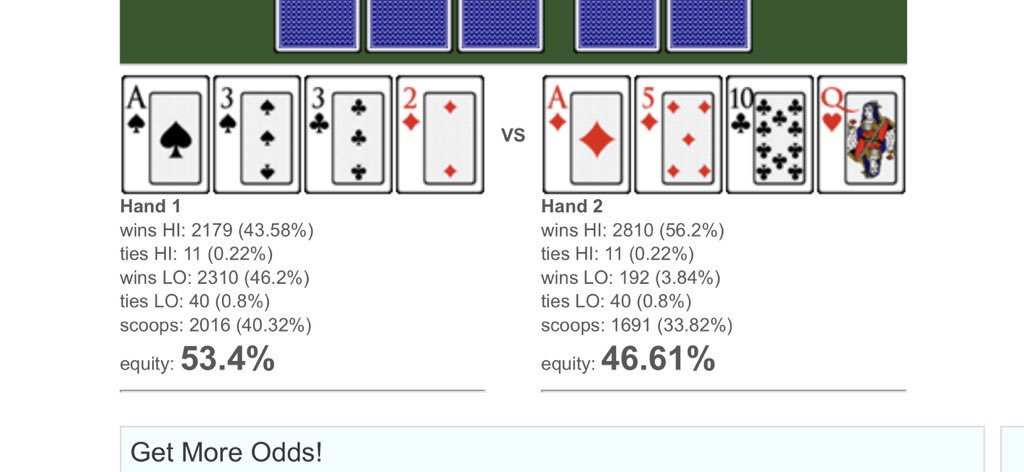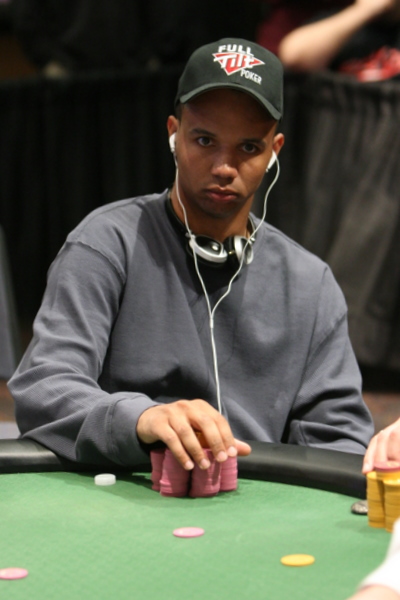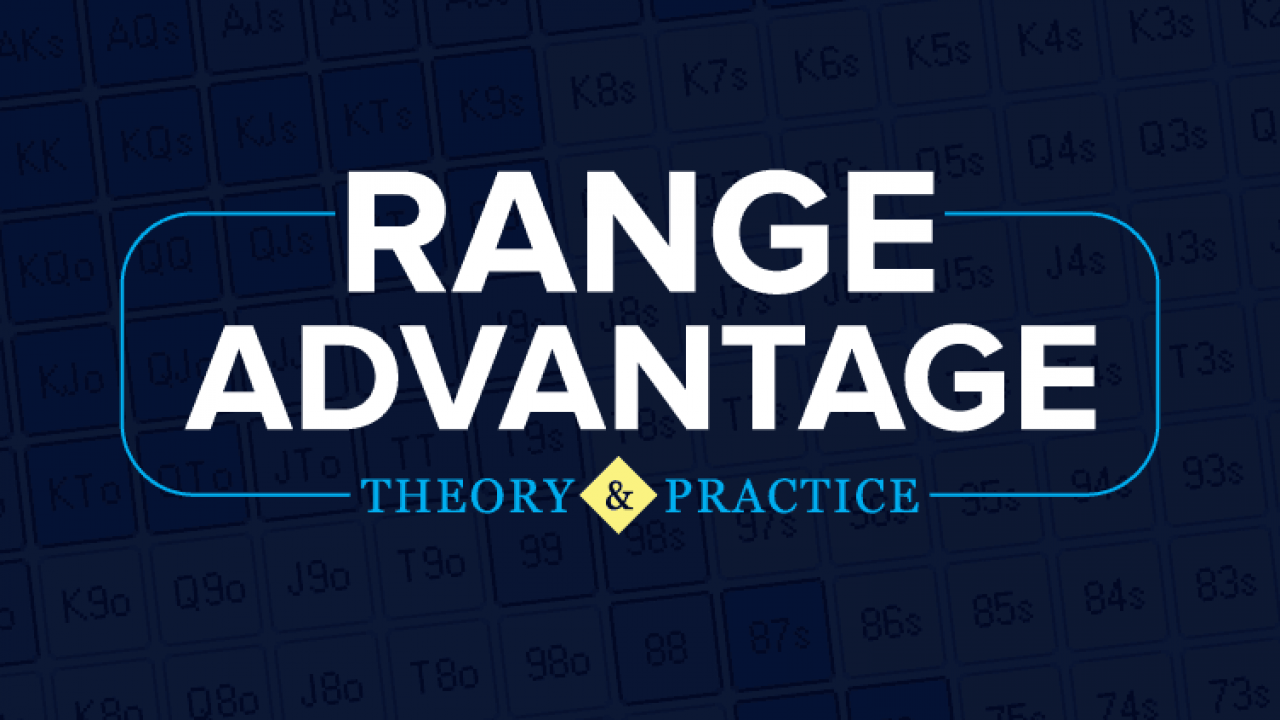Que Es Fold Equity En Poker
Posted : admin On 4/14/2022
Fold equity is a term that has been tossed around more and more over the past few years. As the games have gotten tougher and more advanced, a number of players have picked up on terminology that was once reserved only for top level pros. Fold equity is a concept that is definitely misunderstood by a sizable portion of the poker playing community.
The concept in and of itself is much easier to aptly understand once you are able to experience it first hand. In a nutshell, players create fold equity by playing a hand where they accept a win from showdown, a loss from showdown, or a win from folds. The times where you are able to make a bet, generally a raise or a re-raise, and force a fold will be indicative of the times where you are utilizing fold equity.
Strong players will often make plays that do not find profitability in either the folds or the calls that they get, but instead from a combination of the two. You may or may not be extremely confused by now. If none of this makes any sense, go ahead and read the example immediately below. If this does make sense to you, skip the next section.
An Example of a Hand With Fold Equity
Fold equity is best demonstrated in hands where a player is working with a draw. Draws will give you leverage because they provide an opportunity to suck out on your opponents, win without showdown, or even have a dominant hand at showdown. Pretend that you are dealt JsQs pre flop.
Fold equity is a term that has been tossed around more and more over the past few years. As the games have gotten tougher and more advanced, a number of players have picked up on terminology that was once reserved only for top level pros. Fold equity is a concept that is definitely misunderstood by a sizable portion of the poker playing community.
Fold equity is somewhat of an advanced poker concept, and while the logic is straightforward, the math can be tricky. The concept of fold equity is base on the truism that if nobody calls your bet, you will win 100% of the time. Stated in another way, you have 100% equity in all pots in which you bet and nobody calls. Wenn Sie es mit wirklich loose aggressiven Spielern zu tun haben, ist Ihre Fold Equity wahrscheinlich nahezu null. Dasselbe gilt auch, wenn Sie in Turnieren auf extrem short-stacked Spieler treffen (die nur mehr sehr wenige Chips zum Spielen haben).
The pre flop action consisted of an open raise in early position, a call from middle position, and you calling from late position. The flop came 6s Ts Kh. Not only did you flop a flush draw, but you also have an open ended straight draw. The possibilities for you to make a major hand are seemingly endless.
The action on the flop starts off with a bet from the middle position player who had only called pre flop. You decide to flat call and see the turn, but the early position original raiser decides that they have different plans and puts in a moderately large check raise.
The middle position player now elects to fold their hand and the action is back on you. The early position player will have a monster or nothing at all the vast majority of the time. This will rarely be a situation where the EP player has a hand like KQ. As a result, your plan should be to either go all in or fold.
Going all-in will force folds or get calls from hands which you can outdraw. The EP player could easily have a hand like pocket aces or even an unsuited JQ, both of which would contemplate folding or calling your shove. Assuming they call with AA or JQ, you will either be flipping a coin or have the other player completely dominated.
On the other hand, you could potentially get a fold from these two hands in addition to any number of random bluffs. By going all in after the EP player’s check raise, you are maximizing your fold equity. You make a lot of money when the other player calls and you hit your hand, but you also make money when they fold after you go all in. In the end, a large portion of your equity was derived from the folds that you get. Fold equity is difficult to identify in the short term, but is critical in the long run.
Utilizing Fold Equity
Utilizing and capitalizing on fold equity is important for No Limit Hold'em players because it will give you chances to both cash in on your big hands and help in your efforts to balance ranges. There is a lot of beauty in the proper execution of hands where you have a lot of fold equity.
Solid players will look for every opportunity they can get to go all in when they can force a fold or draw out on their opponent, while a weaker player will play passively and choose to make calls instead. The difference in approaches to tricky situations is one of the common dividers between winning and losing players.
Fold equity is somewhat of an advanced poker concept, and while the logic is straightforward, the math can be tricky. The concept of fold equity is base on the truism that if nobody calls your bet, you will win 100% of the time. Stated in another way, you have 100% equity in all pots in which you bet and nobody calls. Of course you cannot know in advance if your opponents will all fold to you. When you make a bet, sometimes your opponents will all fold and sometimes they will not. When calculating fold equity, you must make an educated guess about the probability that each will occur. For this reason, a fold equity calculation is a type of implied odds calculation, and can be either positive or negative.

Here is how you construct a fold equity calculation mathematically. For simplicity’s sake, we will consider your bet as an all in gambit, although in real life this will not always be the case.

Consider Pf as the probability that all opponents will fold if you bet, Es as your showdown equity, Pw as the probability you will win at showdown, and Pl as the probability you will lose at showdown, such that Fold Equity = (Pf * Pot amount before your wager) + Es. And Es = [(Pw *Pot amount after your wager) +( Pl * Pot amount after your wager)] (1-Pf)
What this means is that the percentage of time that all opponents fold multiplied by the amount of the pot prior to your bet can be considered as your equity, but you also have to include in the equation what occurs when you are called. When you are called, some percentage of the time you will win, and some percentage of the time you will lose. When you win, you will win the amount in the pot after betting and being called. Likewise, when you lose, you will lose the same amount. Multiply each by the probability of each occurring. Then add these two products together. This sum can be a negative or positive amount, depending upon whether or not you have the best starting hand. Even if you have the worst hand, and Es is negative, and it often will be, fold equity can still be positive, because you still have to add the equity you receive when you steal the pot successfully.
Fold equity is an important concept to master for effective bluffing in both live and tournament play. It is most frequently applied to the stealing of blinds in the later stages of tournaments, where it is absolutely crucial for success. In tournament play, a missed opportunity to steal the blinds can be fatal. Understanding when you have fold equity is absolutely critical. A key aspect to this is making a good prediction about the value of Pf, the probability that all opponents will fold. Remember, you are estimating this, and you will have to consider many things if you are to come up with an accurate estimate. Things to consider when predicting how often your opponents call include, how loose or tight they are, your table image, the size of your bet, the size of your stack and your opponents’ relative to each other as well as to the size of the blinds, and many other factors.

Que Es Fold Equity En Poker Strategy
See more explanations on Implied Odds, Pot Odds, and EquityQue Es Fold Equity In Poker Lingo
Que Es Fold Equity En Poker Winnings
Previous Poker Term: Fold EquityNext Poker Term: Forced Bet